Key takeaways:
- Marine stewardship emphasizes the responsible management of ocean resources, requiring collaboration between communities, scientists, and policymakers.
- Ocean conservation is vital for maintaining the health of our planet, supporting biodiversity, and providing food and livelihood for millions.
- Key principles of marine stewardship include sustainability, collaboration among stakeholders, and the importance of education in fostering community involvement.
- Encouraging personal and community actions, such as beach cleanups and local workshops, can create a powerful impact on ocean health and conservation efforts.
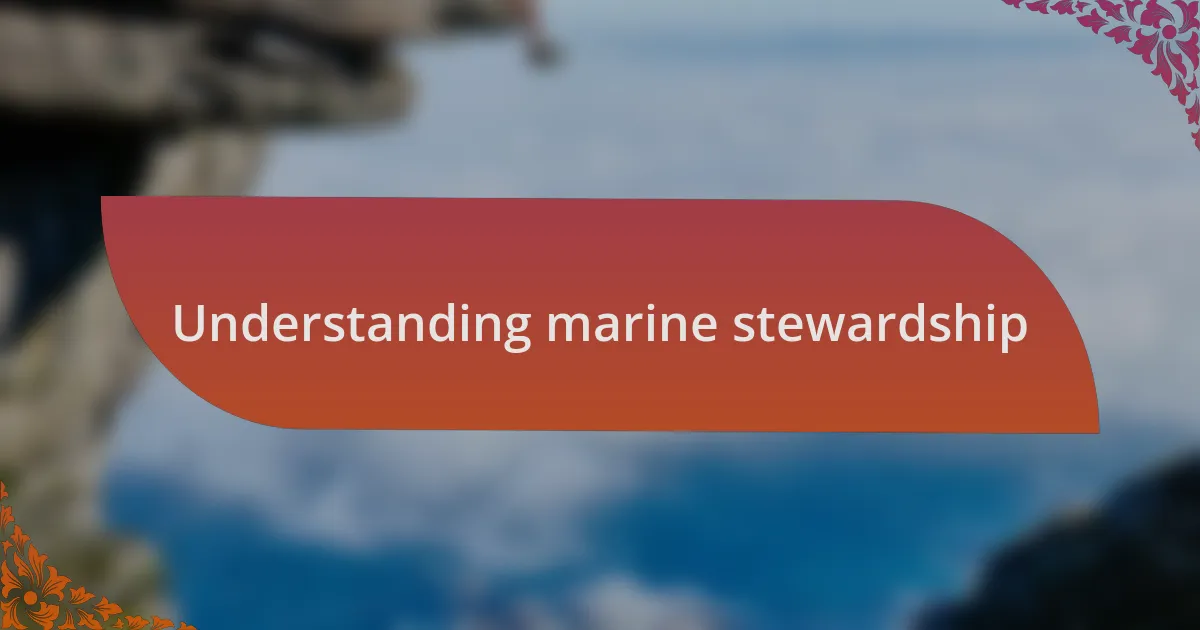
Understanding marine stewardship
Marine stewardship encompasses the responsible management and care of ocean resources to ensure their sustainability for future generations. I recall a moment during a beach cleanup where I found trapped marine life in discarded fishing gear. It made me wonder—how can we not just take from the ocean but also give back?
Understanding marine stewardship means recognizing our interconnectedness with the ocean. I sometimes catch myself staring at the waves, pondering how our actions on land impact marine ecosystems. If we view the ocean as a friend rather than a resource, how radically could our approach shift towards protecting its delicate balance?
At its core, marine stewardship involves collaboration among communities, scientists, and policymakers. One afternoon, I joined a local marine conservation group and felt the power of collective action as we discussed strategies to tackle pollution. It left me thinking—what role do we each play in this vast ecosystem, and how can we actively contribute to its health?
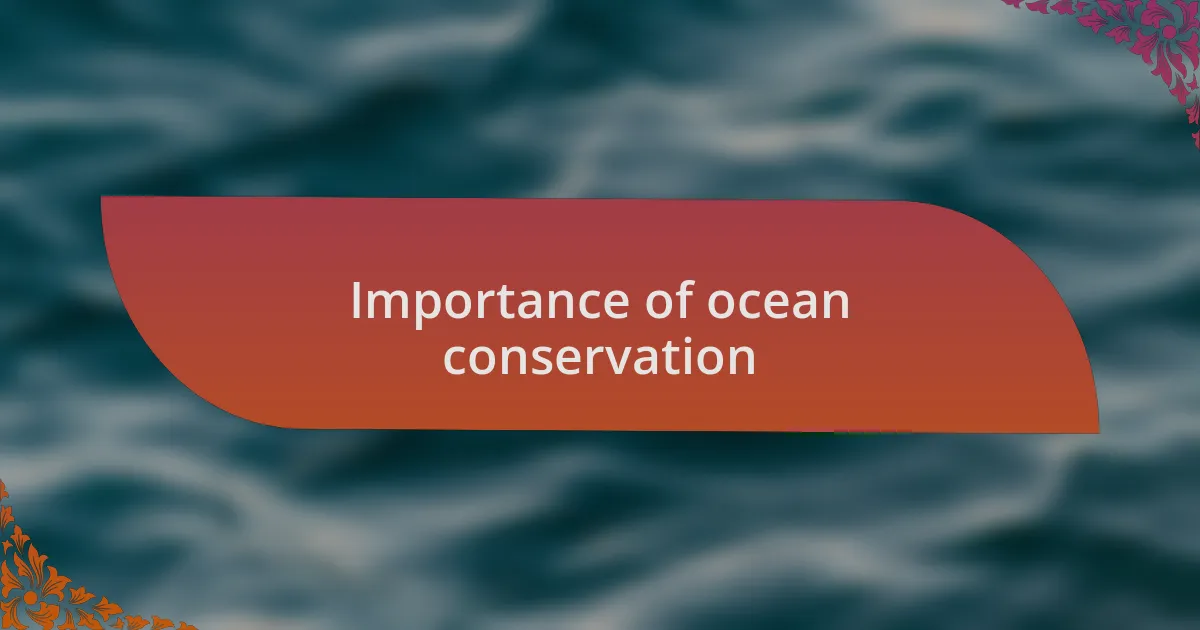
Importance of ocean conservation
Ocean conservation is crucial for maintaining the health of our planet. I remember sitting on a boat, surrounded by the vibrant blues and greens of coral reefs. Seeing the diversity of life below the surface left me in awe, but it also made me realize how fragile these ecosystems are. If we continue to neglect their needs, we risk losing not just beauty, but entire species.
The oceans produce over half of the oxygen we breathe and regulate our climate, yet they face threats from pollution and overfishing. It’s easy to feel overwhelmed by these issues, but I often remind myself that every small action counts. Whether it’s reducing plastic use or participating in local marine initiatives, I believe our contributions can collectively make a significant difference.
Moreover, the oceans serve as a vital source of food, livelihood, and recreation for millions. I once spoke with a local fisherman who shared how declining fish stocks have affected his family’s way of life. His story resonated with me, highlighting that ocean conservation isn’t just an environmental issue; it’s a matter of cultural and economic survival for many communities. How can we afford to turn a blind eye to such an urgent call for action?
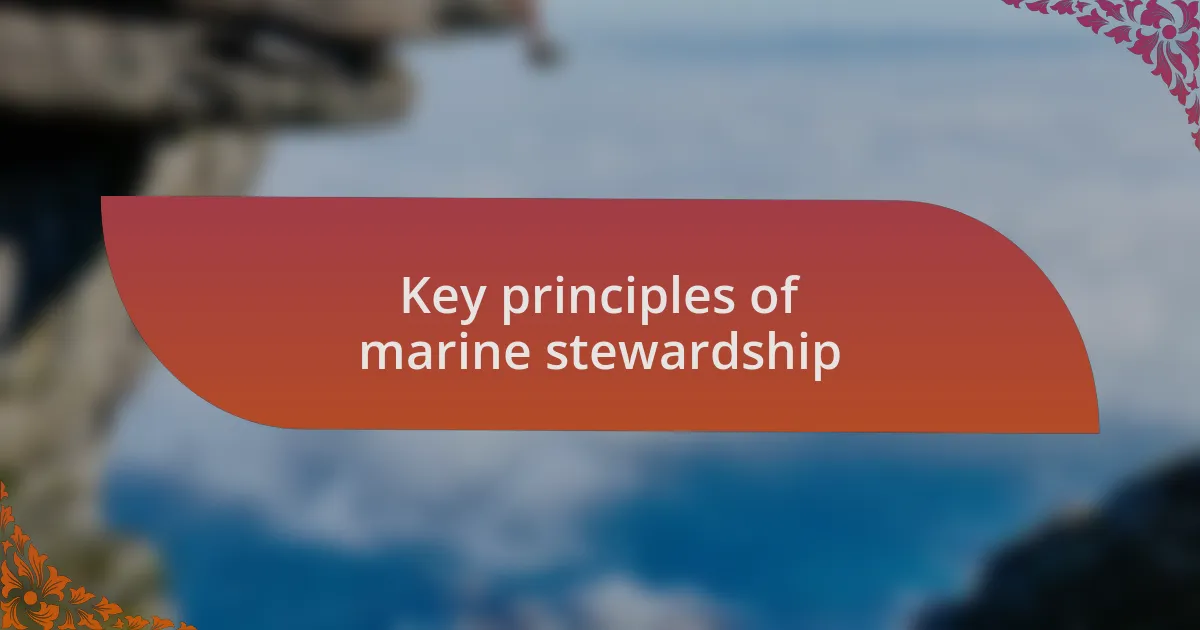
Key principles of marine stewardship
Marine stewardship is underpinned by several key principles, the first of which is sustainability. This means using marine resources responsibly to ensure that future generations can enjoy the same benefits. I often reflect on a time I went snorkeling in a protected marine area, and it struck me how vibrant and teeming with life these waters were. It made me realize that protection and careful management truly allow ecosystems to thrive.
Another crucial principle is collaboration among diverse stakeholders. No single entity can tackle marine challenges alone. I remember attending a community meeting where fishermen, conservationists, and local businesses came together to discuss sustainable practices. The energy in that room was palpable; everyone was invested in finding a common ground. It made me think, how often do we miss opportunities for collective impact by working in silos?
Lastly, education plays a vital role in fostering marine stewardship. The more we understand marine ecosystems, the better equipped we are to care for them. I’ve had moments where simple discussions about ocean health turned into passionate exchanges that inspired others to take action. Isn’t it fascinating how sharing knowledge can spark change? It reinforces my belief that informed communities are the backbone of effective conservation efforts.
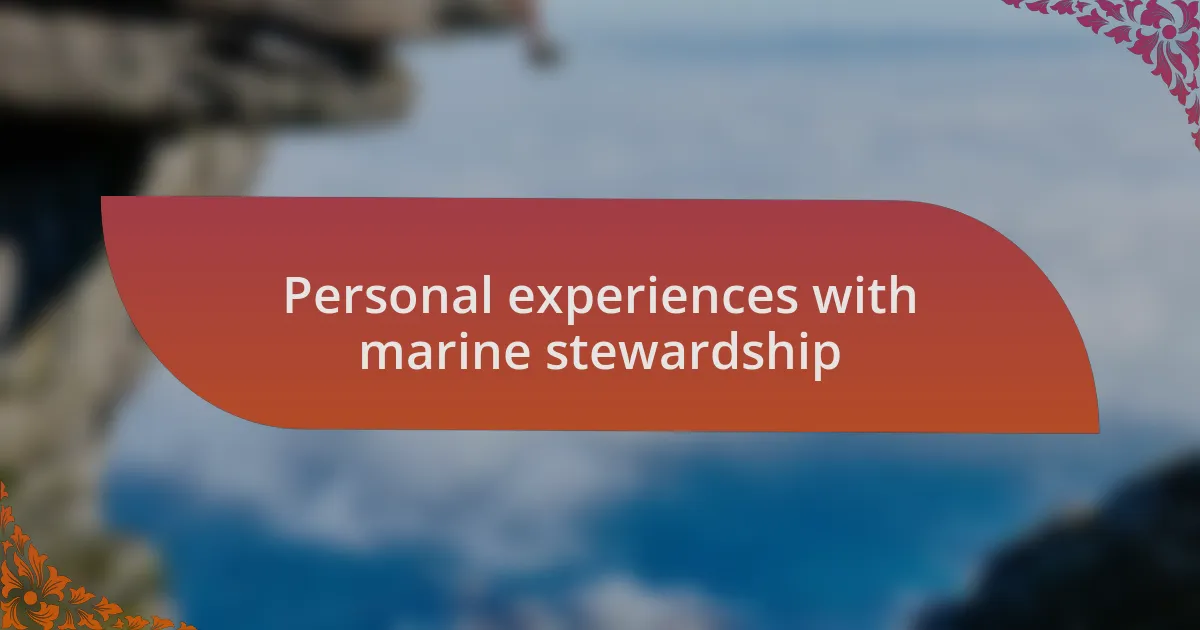
Personal experiences with marine stewardship
Reflecting on my experiences with marine stewardship often leads me to a memorable beach cleanup day. I recall the mixed feelings I had: exhilaration to see so many people show up, yet sadness as I filled my bag with trash that should never have been on that pristine shoreline. Watching kids get excited about picking up litter made me think about how small actions can create ripples of change. Have you ever felt like that, where a simple act surprisingly elevates the collective spirit?
One afternoon, I volunteered on a research boat, collecting data on local fish populations. As I leaned over the side, clutching my clipboard, I felt a deep sense of responsibility wash over me. Every count I made seemed to represent not just numbers but the health of our oceans. It highlighted to me how personal involvement in data collection connects us to the larger narrative of conservation and evokes a sense of urgency within.
A few years back, I ran an educational workshop for local schools, and it was nothing short of enlightening. Witnessing the spark in young minds as they learned about coral reefs was profoundly rewarding. It dawned on me that nurturing this curiosity could lead to passionate advocates for ocean health in the future. Don’t you think passing on our knowledge can create a powerful legacy of stewardship?
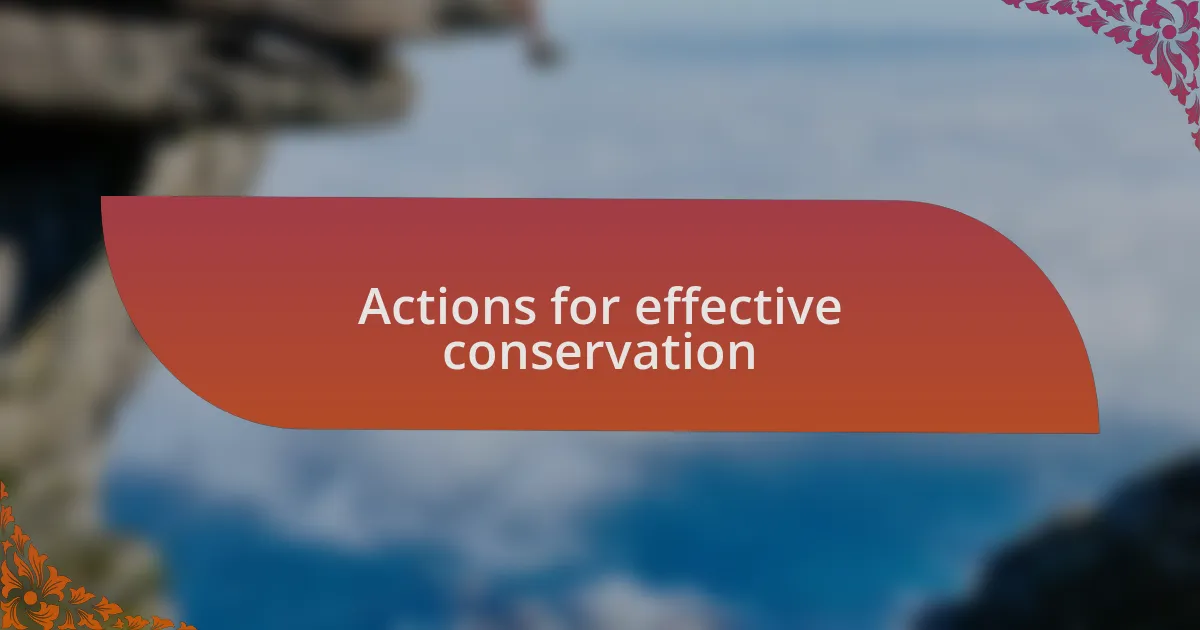
Actions for effective conservation
Taking direct action is crucial for effective conservation. I remember my first experience at a community-led mangrove restoration project. The ground was muddy, and my hands were coated in earth, but the sight of those young saplings taking root reignited my passion for habitat preservation. Have you ever planted something with your own hands and felt an innate connection to that life?
Collaboration is another vital component I’ve witnessed in action. During a marine protection initiative, I joined a diverse group of stakeholders, from fishermen to scientists. We shared our perspectives and worked towards common goals, blending traditional knowledge with scientific research. This gathering underscored the importance of listening to each other’s voices—what better way to protect our oceans than through unity in purpose?
I’ve come to realize that widespread education and advocacy play a significant role in conservation efforts. I once attended a seminar where a passionate speaker discussed the impact of microplastics on marine life, and I felt a pang of urgency. It inspired me to take that information and share it within my own circles. Isn’t it fascinating how knowledge can fuel action and motivate others to care for the ocean?
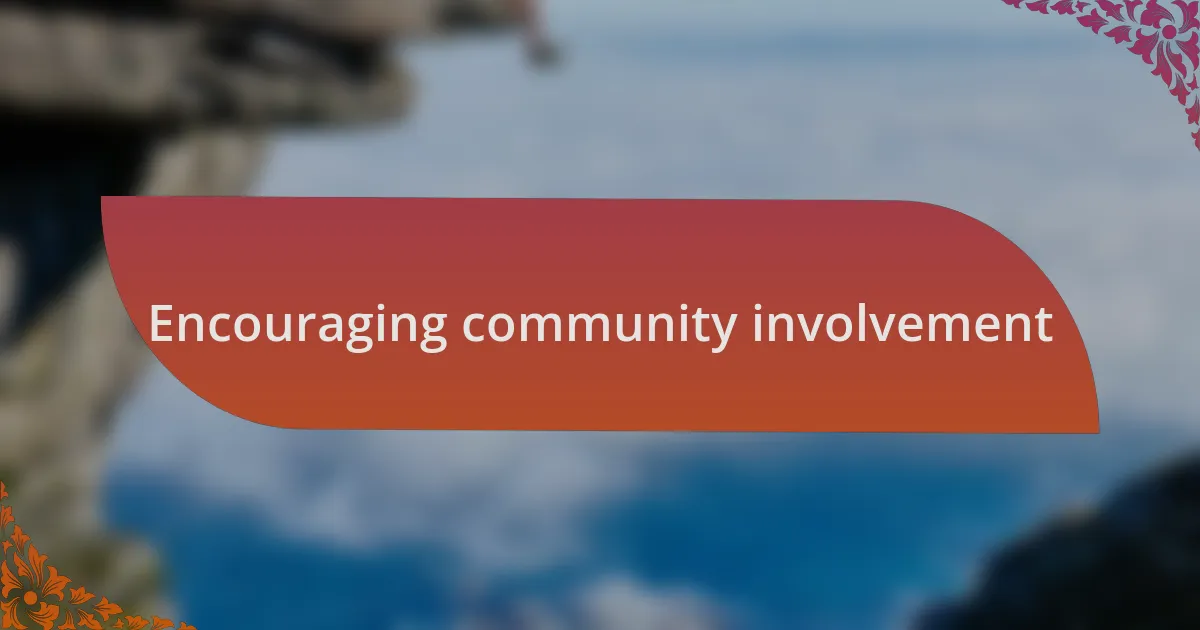
Encouraging community involvement
One of the most rewarding experiences I’ve had in encouraging community involvement was participating in a local beach cleanup. I can still picture the sparkling water and the sand between my toes as we collected trash. As more people joined, a sense of camaraderie blossomed. Have you ever felt that surge of collective purpose? It’s amazing how cleaning our surroundings can also clean our spirits, fostering a deeper connection to the ocean.
I often think about the power of storytelling in engaging local communities. At one event, a fisherman shared his personal experiences with declining fish populations, illustrating the tangible effects of overfishing on his livelihood. The way he spoke moved the audience, bringing the issue to life in a way that statistics alone could never achieve. It made me wonder: how often do we overlook personal stories when talking about environmental challenges?
Cultivating a sense of ownership over coastal resources can turn passive observers into active stewards. During a workshop I hosted, participants crafted action plans for protecting their favorite local spots. The energy in the room was electric as we brainstormed ideas, and by the end, many left inspired to lead their projects. Isn’t it incredible how a little encouragement can spark action? Building this sense of empowerment within communities truly makes a lasting impact on conservation efforts.
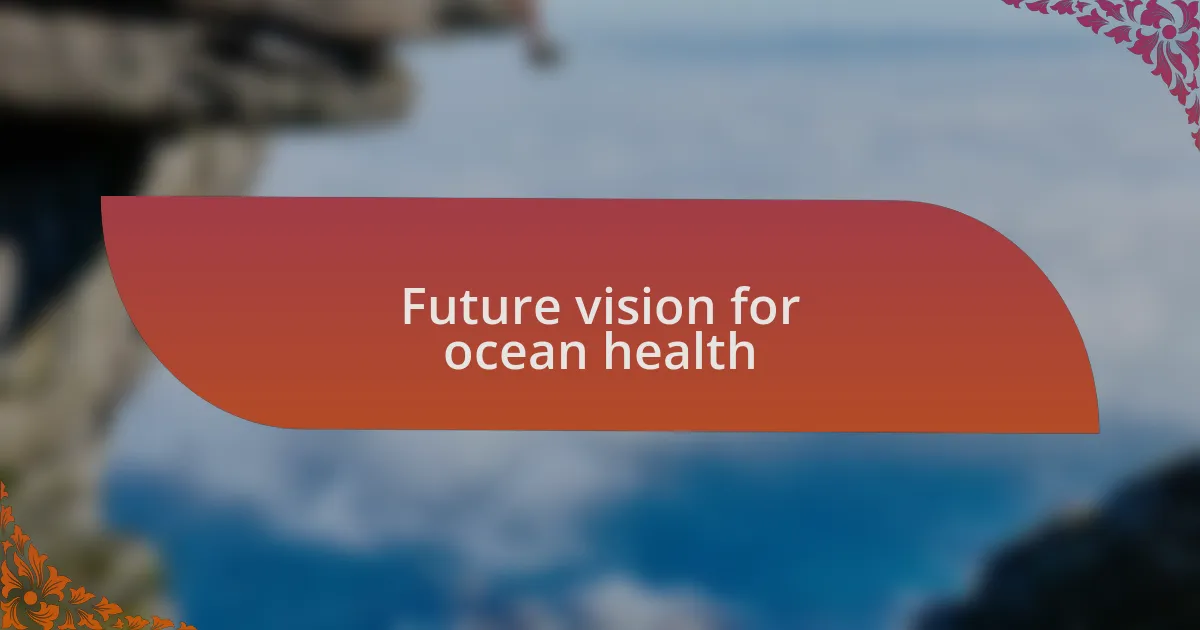
Future vision for ocean health
The vision for ocean health starts with a renewed commitment to sustainability. I remember a time when I was volunteering at a marine research center and saw firsthand how small-scale community efforts could bolster conservation research. It struck me then: the health of our oceans relies on every individual’s awareness and action. What future could we create if more people understood their role in this vital ecosystem?
As I envision the oceans thriving, I often think about the potential for innovative technologies to monitor marine life. During a seminar, experts showcased how drones and underwater sensors could track fish populations more effectively, providing real-time data for sustainable fishing practices. Isn’t it fascinating how technology can bridge the gap between human activities and the natural world? It reinforces my belief that we can harmonize our needs with those of the ocean.
Ultimately, I see education as a cornerstone of future ocean health. Engaging children in marine biology through hands-on experiences can cultivate lifelong advocates for the ocean. I still recall a field trip where kids marveled at the diverse marine life in tide pools, their eyes wide with wonder. Could there be a more profound impact than inspiring the next generation to cherish our oceans? I genuinely believe that fostering this connection will yield the stewards our coasts desperately need.